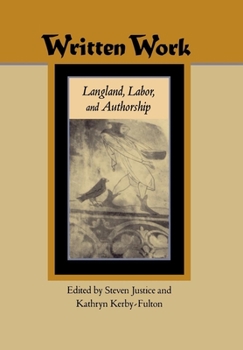Written Work: Langland, Labor, and Authorship
Critics of Piers Plowman have often behaved as if the great fourteenth-century English poem were written by committee, Written Work marks a major shift in orientation by focusing on William Langland instead of Piers Plowman.
The five original historicist studies collected here are less concerned with searching for Langland's identity in medieval records than with examining the marks, even scars, left on him by the history he touched. Derek Pearsall studies what Langland knew about London--its geography, economics, and social life--and the way his focus on the city shifted in the course of revising the poem. Kathryn Kerby-Fulton examines the conditions for authorship and publishing in late fourteenth-century England and uncovers evidence of Langland's struggles to attract patronage and maintain control over the text and circulation of Piers. Anne Middleton's stunning chapter explores how the long shadow of fourteenth-century labor laws fell across Langland as he reworked his text. Ralph Hanna III examines the conflicting demands of manual and intellectual labor on the poet, while Lawrence M. Clopper uncovers the deep impressions that contemporary controversies about Franciscan poverty made on Langland and his life-work. Each of the chapters unfolds from Langland's apologia, the extraordinary autobiographical passage unique to the last of the three distinct versions of Piers Plowman that have come down to us.Format:Hardcover
Language:English
ISBN:0812233964
ISBN13:9780812233964
Release Date:September 1997
Publisher:University of Pennsylvania Press
Length:358 Pages
Weight:1.45 lbs.
Dimensions:1.2" x 6.3" x 9.1"
Customer Reviews
0 rating





